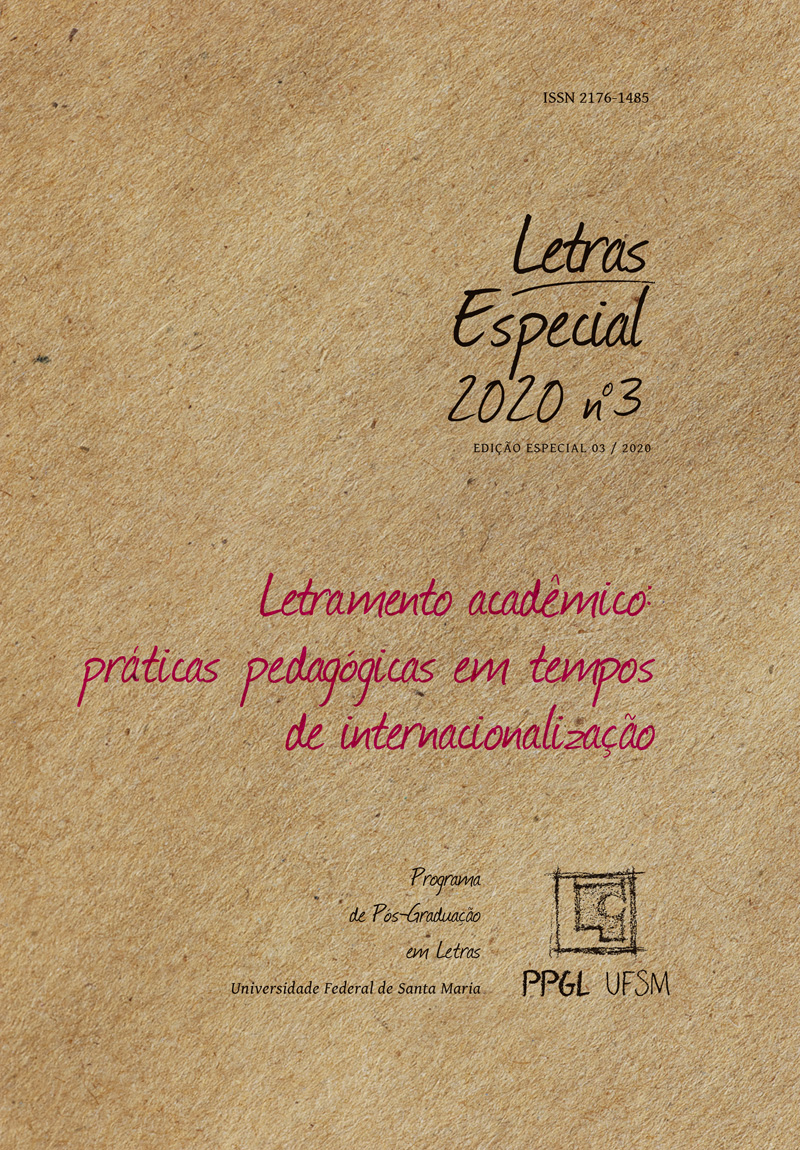Enhancing undergraduate students’ academic writing skills through self-assessment
DOI:
https://doi.org/10.5902/2176148543019Palavras-chave:
Academic writing, Second language learning, Undergraduates, Self-assessmentResumo
Developing the knowledge and the skill to master academic writing in higher education constitutes a challenge for most undergraduate students. However, learning about this style of writing opens students’ doors to the wide world of academia. Thus, some undergraduate students were invited to become members of a Writing Feedback Center in which they worked with a tutor and a self-assessment sheet on different writing assignments following an eclectic approach to writing. In this work we analyzed students’ and tutors’ perceptions on self-assessment in relation to the development of their academic skill.
Downloads
Referências
ANDRADE, H.; VALTCHEVA, A. Promoting learning and achievement through self-assessment. Theory Into Practice, v. 48, p. 12-19, 2009. 10.1080/00405840802577544. DOI: https://doi.org/10.1080/00405840802577544
BOUD, D. Implementing student self-assessment. HeRDSA green guide. 2. ed.Sydney: HERDSA, 1991.
BROWN, G. T. L. Teachers’ conceptions of assessment: implications for policy and professional development. Assessment in education: Principles, Policy & Practice, v. 11, n. 3, p. 301-318, 2004. DOI: https://doi.org/10.1080/0969594042000304609
CARLINO, P. Concepciones y formas de enseñar escritura académica. Un estudio contrastivo. Signo & Seña, Facultad de Filosofía y Letras: Universidad de Buenos Aires, v. 16, p. 71- 117, 2006.
CHAPPUIS, S.; CHAPPUIS, J. The best value in formative assessment. educational Leadership, v. 65, n. 4, p. 14-19, 2008.
DAVIES, M. The role of the amygdala in conditioned and uncondi-tioned fear and anxiety. In: AGGLETON, J. P. (Ed.). The amygdala: a functional analysis. 2. ed. Oxford, UK: Oxford University Press, 2000, p. 213-228.
DÖRNYEI, Z. Research methods in Applied Linguistics. quantita-tive, qualitative and mixed methodologies. Oxford, UK: Oxford University Press, 2007.
DUNNING, D.; HEATH, C.; SULS, J. M. Flawed self-assessment: impli-cations for Health, Education, and the workplace. Psychological Science in the Public Interest, v. 5, n. 3, p. 69-106, 2004. https://doi.org/10.1111/j.1529-1006.2004.00018.x DOI: https://doi.org/10.1111/j.1529-1006.2004.00018.x
FITZMAURICE, M.; O’FARRELL, C. Developing your academic wri-ting skills: a handbook. Trinity College Dublin, 2014. Retrieved from: <https://www.tcd.ie/CAPSL/readysteadywrite/AcademicWritin-gHandbook.pdf>.
GONZÁLEZ, M.; ROMANO, M. Writing feedback center. Facultad de Lenguas: UNC, 2018.
HINKEL, E. Teaching academic eSL writing: practical techniques in vocabulary and grammar. Mahwah, NJ: L. Erlaum Associates, 2004. DOI: https://doi.org/10.4324/9781410609427
HYLAND, K. Genre-based pedagogies: a social response to process. Journal of Secondb Language Writing, v. 12, n. 1, p. 17- 29, 2003. DOI: https://doi.org/10.1016/S1060-3743(02)00124-8
HYLAND, K. Genre and second language writing. In: BELCHER, D.; JUN LIU (Eds.). Michigan series on teaching multilingual writers. Michigan: The University of Michigan Press, 2007.
JOYCE, B.R.; WEIL, M.; CALHOUN, E. Models of teaching. 8. Ed. Pearson, 2009.
MARTIN, J.R.; ROSE, D. Working with discourse: meaning beyond the clause. London: Continuum [2nd Revised Edition 2007], 2003.
MARTÍNEZ, J. I.; ROMANO, M. E. Handout of reading material and writing practice. Facultad de Lenguas: FL (Copias de Natalia Rondini), 2019.
MELISSOURGOU, M. N.; FRANTZI, K.T. Genre identification based on SFL principles: the representation of text types and genres in English language teaching material. Corpus Pragmatics, v.1, n. 4, p. 373-392. 2017. DOI: https://doi.org/10.1007/s41701-017-0013-z
OXFORD, R. Teaching and Researching language learning stra-tegies: self-regulation in context; Applied linguistics in action. New York: Routledge, Taylor & Francis Group, 2017.
STAKE, R. The art of case study research. Thousand Oaks, CA: Sage, 1995.
STIGGINS, R. J.; CHAPPUIS, J. What a difference a word makes: as-sessment FOR learning rather than assessment OF learning helps students succeed. Journal of Staff Development, v. 27, n. 1, p. 10-14, 2006.
STIGGINGS, R. J. Assessment crisis: the absence of assessment for learning. Phi Delta Kappan, v. 83, n. 10, p. 758-765, 2002. Retrieved at:<http://www.electronicportfolios.org/afl/Stiggins-AssessmentCrisis.pdf>. DOI: https://doi.org/10.1177/003172170208301010
Downloads
Publicado
Versões
- 2023-05-12 (4)
- 2022-07-26 (3)
- 2022-07-04 (2)
- 2021-10-19 (1)
Como Citar
Edição
Seção
Licença
Copyright (c) 2021 Letras

Este trabalho está licenciado sob uma licença Creative Commons Attribution-NonCommercial-ShareAlike 4.0 International License.
Ficam concedidos a Letras todos os direitos autorais referentes aos trabalhos publicados. Os originais não devem ter sido publicados ou submetidos simultaneamente a outro periódico e não serão devolvidos. Em virtude de aparecerem nesta revista de acesso público, os artigos são de uso gratuito, com atribuições próprias, em aplicações educacionais e não comerciais.






